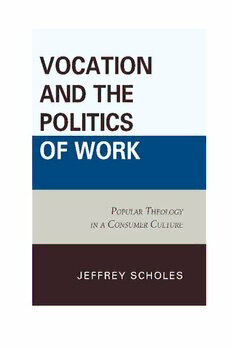
Vocation and the Politics of Work : Popular Theology in a Consumer Culture PDF
Preview Vocation and the Politics of Work : Popular Theology in a Consumer Culture
Vocation and the Politics of Work Vocation and the Politics of Work Popular Theology in a Consumer Culture Jeffrey Scholes LEXINGTONBOOKS Lanham•Boulder•NewYork•Toronto•Plymouth,UK PublishedbyLexingtonBooks AwhollyownedsubsidiaryofTheRowman&LittlefieldPublishingGroup,Inc. 4501ForbesBoulevard,Suite200,Lanham,Maryland20706 www.rowman.com 10ThornburyRoad,PlymouthPL67PP,UnitedKingdom Copyright©2013byLexingtonBooks Allrightsreserved.Nopartofthisbookmaybereproducedinanyformorbyany electronicormechanicalmeans,includinginformationstorageandretrievalsystems, withoutwrittenpermissionfromthepublisher,exceptbyareviewerwhomayquote passagesinareview. BritishLibraryCataloguinginPublicationInformationAvailable LibraryofCongressCataloging-in-PublicationData Scholes,Jeffrey,1971– Vocationandthepoliticsofwork:populartheologyinconsumerculture/JeffreyScholes. pagescm Includesbibliographicalreferences. ISBN978-0-7391-7890-4(cloth:alk.paper)—ISBN978-0-7391-7891-1(ebook) 1.Vocation—Christianity.2.Work—Religiousaspects—Christianity.3.Consumption(Econom- ics)—Religiousaspects—Christianity.4.Christianityandculture.I.Title. BV4740.S3152013 261.8'5—dc23 2012046617 ThepaperusedinthispublicationmeetstheminimumrequirementsofAmerican NationalStandardforInformationSciencesPermanenceofPaperforPrintedLibrary Materials,ANSI/NISOZ39.48-1992. PrintedintheUnitedStatesofAmerica Contents Introduction 1 1 TheologyofVocationandtheRoleofWork 19 2 TheologyatWork 49 3 ConsumerCultureandItsEffects 83 4 ThePurchase-DrivenLife 109 5 TowardsaPoliticalVocation 141 Bibliography 171 Index 181 v Introduction Studs Turkel’s popular 1972 book, Working, recounts the testimony that Nora Watson, a staff writer for an institution that publishes health care literature, gives about the meaning of her job. She laments, “A job like mine,ifyoureallyputyourspiritintoit,youwouldsabotageimmediate- ly. You don’t dare. So you absent your spirit from it. My mind has been so divorced from my job, except as a source of income, it’s really ab- surd.”1 Later, Nora adds, “I’m coming to a less moralistic attitude to- wardswork....Idon’tthinkIhaveacalling—atthismoment—exceptto beme.Butnobodypaysyouforbeingyou,soI’mattheInstitution—for themoment.Whenyouaskmostpeoplewhotheyare,theydefinethem- selvesbytheirjobs.‘I’madoctor.’‘I’maradioannouncer.’‘I’macarpen- ter.’Ifsomebodyasksme,Isay,‘I’mNoraWatson.’”2 Nora’stestimonyexpressesafamiliarneed:tolocatelife’sactivitiesin abroader,deeper contextinordertogainsatisfactionthroughtheirper- formance.Sheisalsoconveyingthedifficultyinconnectingafundamen- talactivityformost(work)toadeeper,fullercontext,orasshecallsit,a calling or a vocation. Stating that her calling, for the moment, is just “to be me” betrays the problem that arises when work and a vocation are decoupled.Ifone’sspirithasvacatedandone’smindhasdivorcedfrom anactivityascrucialtosatisfactionwithlifeasdailyworkcanbe,having a calling that only requires Nora to be herself may not be enough to endurethedailygrind. This need to couple daily, remunerated work with a serious purpose for doing it draws on a five-hundred-year history of the Protestant con- cept of vocation. Since Martin Luther, all work, not just priestly work, holds the potential to be godly or to be a response to God’s call. This democratization of vocations has mercifully elevated the status of lowly jobs, yet it has also burdened work with the duty to be meaningful and satisfactory. As Max Weber famously pointed out over a century ago, even though vocational work may have lost a connection to any divine metaphysical truth, it is still pursued with a kind of religious vigor.3 Whether a vocation is considered to be a response to an actual call from Godoritisusedtosatisfytheneedforlife’sactivitiestobegreaterthan thesumofitsparts,itstillholdsimmensesocietalvalue. Andrew J. Weigart and Anthony J. Blasi express the importance of vocationsinevenstrongerterms: 1 2 Introduction Much of the change and resistance to change in social life takes the form ofthelong-termcommitments that peoplehave and which they experience as transcendingcallings.Vocationsare not thetotalexpla- nation for history—i.e., for change and resistance to change; one can cite alienation, disaffection, greed, lethargy and conventionality as well.Butvocationssurelyfilloutamajorpartofthepicture.4 In terms of work, it is these long-term commitments manifesting in the formofacareerthatfeedoffofthesatisfactionwithone’sworktosustain themselves. Satisfaction with work is, of course, measured differently depending on the worker and on the context of the job. It is safe to say that for most workers in the West today, job satisfaction entails much morethanthemeetingofbasicneedssuchasfoodandshelter.Whatever factors lead to job satisfaction, if a vocation is to retain any cultural cur- rencyintheworldofwork,itmustalignitselfwiththese.Alternatively, whateverfactorsleadtojobdissatisfaction,one’sconceptionofhisorher ownvocationshouldbeabletoopposethese. So when work is not living up to the demands that a vocation can place on it, a divide between work and a vocation opens up, as Nora’s testimony exhibits. This divide, especially for those who expect their work to be vocational, invites several responses. If the jurisdiction of a vocation has been overextended to include all types of daily work, then theexpectationthatanyjobshouldbeabletodeliveronakindofspiritu- alfulfillmentneedstobelowered,orthejurisdictionofavocationneeds to be narrowed. Or if paid work and the activities that would befit a callingare mutuallyexclusiveinreality,thentheproject tointegratethe two should be abandoned once and for all. Or work must produce a certainlevelofemotionalorpsychologicalsatisfactioninorderforittobe vocation,andthenweshouldceaseexpectingtheworkitselftobe“call- ing-worthy.” Or finally, perhaps the problem lies not with the lack of agreementbetweenavocationandone’sfeelingaboutoneselfatworkbut with the current inability of vocations to engage work and the material andpoliticalfactorsthatleadtosatisfactionordissatisfaction. The twofold purpose of this book is to elucidate the causes of this latter “vocation problem” and in so doing, suggest the conditions that allowforsolutions.Togetattheproblem,Ifirstshowthattheabstraction of the Protestant concept of vocation from actual work by theologians overthelast fivehundredyearscontributestoitsinabilitytoengagethe concreteworkworld.Thesegradualmovestowardsabstractionhaveof- ten been made, sometimes consciously, sometimes not, in response to changesinthesocioeconomicenvironmentasitinvolvesthemeaningof work.Thus,Ifollowthisanalysiswithacompanionpiecetothetheologi- cal history that demonstrates the effects of culture on the nature and comprehension of daily work. I pay special attention to the shift in the twentieth century West from societies organized around production to those now organized around consumption. It is this transition that also
